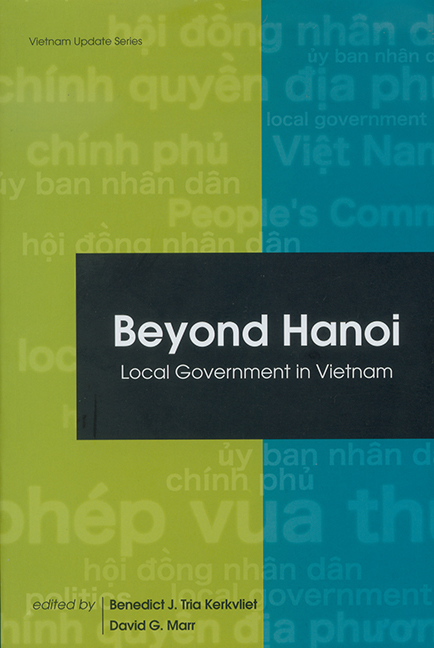Book contents
- Frontmatter
- Contents
- Preface
- Abbreviations
- 1 Surveying Local Government and Authority in Contemporary Vietnam
- 2 A Brief History of Local Government in Vietnam
- 3 Village Government in Pre-colonial and Colonial Vietnam
- 4 Caught in the Middle: Local Cadres in Hai Duong Province
- 5 Winter Crop and Spring Festival: The Contestations of Local Government in a Red River Delta Commune
- 6 Local Politics and Democracy in a Muong Ethnic Community
- 7 Local Government in the Exercise of State Power: the Politics of Land Allocation in Black Thai Villages
- 8 Urban Government: Ward-level Administration in Hanoi
- 9 The Facilitators of Rural Transformation and Development: The Role of Agricultural Extension Officers in Two Districts of Long An Province
- 10 Ho Chi Minh City's Post-1975 Political Elite: Continuity and Change in Background and Belief
- 11 Push, Pull, and Reinforcing: The Channels of FDI Influence on Provincial Governance in Vietnam
- Glossary of Vietnamese Terms
- Index
- About the Contributors
9 - The Facilitators of Rural Transformation and Development: The Role of Agricultural Extension Officers in Two Districts of Long An Province
Published online by Cambridge University Press: 21 October 2015
- Frontmatter
- Contents
- Preface
- Abbreviations
- 1 Surveying Local Government and Authority in Contemporary Vietnam
- 2 A Brief History of Local Government in Vietnam
- 3 Village Government in Pre-colonial and Colonial Vietnam
- 4 Caught in the Middle: Local Cadres in Hai Duong Province
- 5 Winter Crop and Spring Festival: The Contestations of Local Government in a Red River Delta Commune
- 6 Local Politics and Democracy in a Muong Ethnic Community
- 7 Local Government in the Exercise of State Power: the Politics of Land Allocation in Black Thai Villages
- 8 Urban Government: Ward-level Administration in Hanoi
- 9 The Facilitators of Rural Transformation and Development: The Role of Agricultural Extension Officers in Two Districts of Long An Province
- 10 Ho Chi Minh City's Post-1975 Political Elite: Continuity and Change in Background and Belief
- 11 Push, Pull, and Reinforcing: The Channels of FDI Influence on Provincial Governance in Vietnam
- Glossary of Vietnamese Terms
- Index
- About the Contributors
Summary
Like Thomas Sikor's contribution in this volume, this chapter stresses the positive influence of district level government on rural people's lives. I focus particularly on district agricultural extension officers and their disparate approaches to promoting agricultural development in the two districts of Ben Luc and Duc Hoa (see Map 1). Beyond transferring agricultural information and technology, district extension officers in these two districts have been able to adopt informal strategies that have significantly altered the social and agricultural patterns in their constituencies.
I begin by describing the localized nature of agricultural extension in Long An and then outline the goals and functions of the district extension officers. I propose that during the dynamic reform period of the 1990s extension agents played a valuable role and helped fill the power vacuum that Pham Quang Minh's chapter says has existed in rural Vietnam since the retreat of collectivization and central planning of agricultural production. Whilst extension officers have helped farmers devise their own agricultural strategies, they have also served as linchpins between local government and local farming communities. Extension officers are positioned at a blurred interface between society and the local state. To highlight this ambiguous position I conceptualize them as “associates of the state” rather than state actors.
Next I explore the different strategies pursued by extension officers in Ben Luc and Duc Hoa, and highlight their role in promoting household farming units whilst also facilitating formal and informal cooperative groups. I conclude that extension agents have played an important but transitional part in the agricultural development of Long An, and that their future roles are uncertain.
Reinventing agricultural extension in the early 1990s
The Agricultural Extension Centre (Trung tam Khuyen nong) in Tan An was established by the Long An People's Committee in September 1991. Its stated duty was “to be at the cutting edge of developing the countryside today”.
- Type
- Chapter
- Information
- Beyond HanoiLocal Government in Vietnam, pp. 229 - 258Publisher: ISEAS–Yusof Ishak InstitutePrint publication year: 2004

